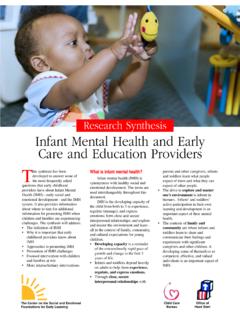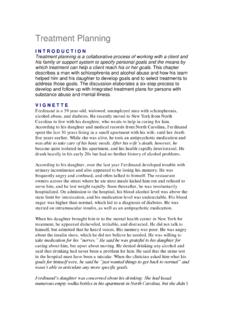Transcription of Cross cultural issues in counselling skills training
1 Gilbert, J. (2001) Cross cultural issues in counselling skills training : Lessons from Lesotho. The Health Exchange, April, 18-19. Gilbert, J. (2001) Cross cultural issues in counselling skills training : Lessons from Lesotho. (Part 2) The Health Exchange, June, 22-24. Cross cultural issues IN counselling skills . training : LESSONS FROM LESOTHO. Introduction In The North in recent years there has been as astonishing increase in the provision of counselling in many different forms, and for many different kinds of problems . Although the empirical evaluation of the effectiveness of counselling remains complex (not discussed in this paper) there is now a plethora of counselling skills and counselling training courses in the North, some of which have been exported to countries in the South, particularly as part of trauma and psychosocial programmes.
2 training in counselling and counselling skills is thus being offered to those whose cultural backgrounds are very different from the culture in which such approaches to helping others was initially developed. This paper questions the relevance of counselling theory to cultures whose fundamental assumptions are very different from those in which such theory was developed, reviews some of the practical and theoretical challenges in designing a workshop in counselling skills for Basotho mental health professionals in Lesotho, and puts forward some of what was learned to help ensure such training can be more culturally specific. Theoretical issues Although counselling skills are primarily taught through practical and experiential learning, these practical approaches to working with people are based on specific theoretical and cultural assumptions, particularly in relation to the self.
3 The self as in the need to understand the client's inner world, and also the self in relation to developing the personal skills and self knowledge of the helper. All counselling training , of whatever theoretical orientation, is based on the premise that greater knowledge and understanding of one's own self determines one's capacity to help and understand another. These theoretical understandings of self are rooted in North American/European culture and it can sometimes be forgotten that these assumptions regarding the experience of self may not apply to those from very different cultural backgrounds. Some cultures, such as Japanese, Chinese, and tribal cultures socialise their peoples predominantly in an interdependent view of self.
4 This view of self prioritises the relatedness of individuals to each other, attending to others, fitting in, and harmonious interdependence with them. On the other hand, cultures of the North assume an independent view of self in which establishing and maintaining independence from others and discovering and expressing unique inner attributes is given priority. These cultural assumptions have profound implications for how an individual experiences him/herself and what is considered emotionally mature adult behaviour. In cultures with an interdependent view of self, maturity is considered to be the control and reduction of one's own individual views and needs, and establishing a social position within a host of inter-relationships and networks.
5 In cultures with an independent view of self, separateness and independence are culturally valued, and the capacity to express one's own views and opinions is considered an essential part of self development. Applying counselling theory to cultures with different assumptions about self . is intrinsically problematic because all the underlying theoretical assumptions stem from the individualistic culture of North America, in which an independent view of the self is implicitly assumed. Can such theoretical assumptions have relevance to a culture with an interdependent view of self, such as that of the Basotho people in Lesotho? Can counselling skills training developed in the North have any value in a culture with very different implicit assumptions, and, if so, how should such training be modified?
6 Background to the workshop The workshop on counselling skills described in this paper was part of Year Three of the Dolen Cymru-Lesotho Mental Health Project. Wales and Lesotho have been twinned since 1985, and many kinds of exchanges of skills and experiences have taken place. In 1997 it was decided to embark upon a Mental Health Project to develop the skills of Village Health Workers. As part of this programme a Community Mental Health Nurse from Lesotho visited Wales to assess what services were available and training in generic counselling skills was identified. The author, because of prior experience in teaching mental health in an African context, was approached to design and deliver a five day counselling skills workshop for personnel in the Mental Health Services in Lesotho who would then train Village Health Workers.
7 Planning and reservations I have some experience in combining both Western and traditional approaches within Cross cultural teaching in mental health in Africa, but not specifically counselling skills training . I was privately sceptical about the topic chosen (discussed earlier) but I was also enthusiastic about the challenge of preparing something that had to be culturally appropriate. The preparation was further complicated by difficulties in communicating directly with staff in the Mental Health Services in Lesotho to establish what their contribution and expectations might be. A list of 29 participants, comprising psychiatric nurses, psychiatric social workers, some general nurses and senior staff within the Mental Health Services, was provided a short time before departure, but without specific information on job responsibilities or previous experience.
8 Workshop Methods How to prepare a workshop on counselling skills for those in Lesotho - a culture with very different underlying assumptions and whose home language is Sesotho? counselling skills are people skills , so what can be learned by lectures or reading is very limited. Thus, experiential methods developing self awareness and personal skills are always the predominant modes of learning used in such courses. To what extent could these theories, assumptions and methods be appropriate or relevant? I felt that priority must still be given to experiential learning, but that the programme needed to be open ended and flexible so that the participants could give guidance themselves as to what seemed to them relevant and appropriate.
9 This involved the risks of having to adapt and change much of the prepared material on arrival and during the workshop. Although I did have serious doubts about the cultural appropriateness of counselling theory, I had no doubts as to the crucial importance of language. My previous experience had taught me that in the area of mental illness/emotional distress, many common English words, such as stress , anxiety have no direct equivalent in African languages. Also, some descriptions of emotions in other languages cannot be translated into English. The workshop therefore had to be designed such that exploration of language differences was an integral part of the work.
10 It was hoped that, through the creative exploration of the Sesotho language and the workshop experiential tasks, emotional expression and language in the Basotho people could be more clearly understood both by the participants and the facilitators. The participants would be carrying out their own further teaching in Sesotho, so it was essential that this language be used as much as possible for all experiential and small group work. I also hoped that a Sesotho dictionary of counselling terms and words used to describe feelings could be developed by the participants to match those that I had provided in English, and that these might be useful additional teaching resources for the participants.





